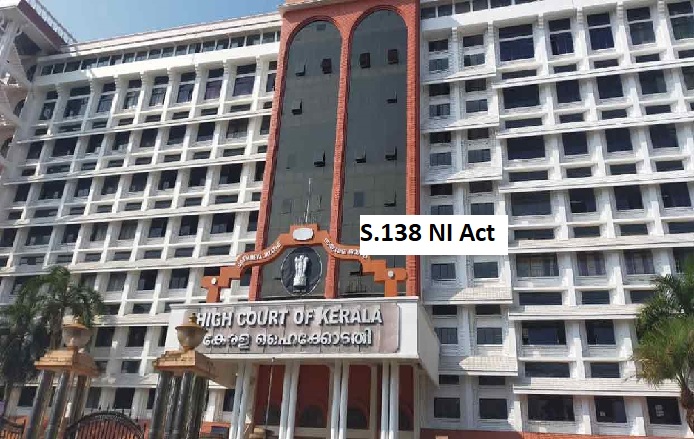


The Kerala High Court has reaffirmed that in a Section 138 NI Act complaint by a company, an authorized representative can depose for the complainant, as long as they can prove knowledge of the complaint's contents and authorization.
Justice C.S. Dias made this determination when considering whether the directions from Narayanan A.C v. State of Maharashtra (2013) would apply directly to a Section 138 NI Act complaint filed by a power of attorney of a company, given the recent decision in M/S TRL Krosaki Refractories Ltd. v. SMS Asia Pvt. Ltd. & Ors. (2022).
Justice Dias observed that in M/S TRL Krosaki Refractories Ltd., a subtle distinction was made. It clarified that in a complaint by a company/firm, the assertion of the power of attorney holder's knowledge, as mentioned in Narayanan A.C., doesn't need to be in an identical manner or just as the accused understands it.
"When the complainant/payee is a company, an authorized employee can act on its behalf. Hence, the legal principle in Narayanan.A.C. primarily pertains to individual complainants, not companies or firms."
The complainant firm, Popular Motor Corporation, represented by its Branch Manager, filed a complaint against the accused. They alleged that the accused issued two cheques, one for Rs.1,60,000 and another for Rs.20,000, to fulfill a legal obligation, but the cheques bounced due to insufficient funds. The accused didn't pay despite a statutory notice.
The Magistrate acquitted the accused, mainly because the complaint didn't specify the complainant's status and because the Branch Manager was deemed unfit to file and pursue the complaint.
The appellant's counsel argued that the Magistrate's observation about the complaint lacking a statement about the complainant's status was incorrect. They pointed out that paragraph 1 of the complaint explicitly mentioned the complainant being a firm. The counsel further stated that a resolution had authorized the Branch Manager to represent the complainant. Additionally, the firm's Accountant, who testified during the trial, affirmed his awareness of the transaction and the execution of the cheque in his presence.
The Public Prosecutor argued that, following the precedent set in Narayanan A.C. (Supra) and upheld in Shibu.L.P v. Neelakantan (2021), it was established that the complaint must contain a clear statement asserting that the power of attorney holder possesses knowledge of the cheque. Without this specific assertion, the power of attorney holder cannot be examined as a witness.
Based on the precedent set in M/S Shankar Finance & Investments v. State of Andhra Pradesh & Ors. (2008), the Court determined that the Magistrate's decision, deeming the Branch Manager incompetent to file the complaint, was in error.
The Court examined the ruling in TRL Krosaki Refractories Ltd. (Supra), which distinguished itself from the position established in Narayanan A.C. (Supra). It emphasized that when a company acts as the payee in a complaint filed under Section 138 of the Negotiable Instruments Act (NI Act), the complainant should invariably be the company itself, and it must be represented by an authorized employee. In such instances, the complaint need only convey that the company is represented by an authorized individual who possesses knowledge of the matter. The Court made it clear that the use of terms like "specific assertion" or "explicit assertion" concerning the knowledge of the power of attorney holder, as mandated by A.C. Narayanan (Supra), should not be narrowly interpreted to require a particular form or manner of expression. What's essential is demonstrating to the learned Magistrate that the complaint is filed in the name of the "payee" and that the person prosecuting the complaint is distinct from the payee but authorized to do so, with knowledge of the complaint's contents. Such an assertion and prima facie evidence are adequate for the Magistrate to take cognizance and initiate the legal process.
The Court also reviewed the decision in Basheer K. v. C.K. Usman Koya & Anr., which outlined the five essential elements that the factual allegations in a complaint under Section 138 of the Act should specify.
Upon careful consideration, the Court concluded that the complainant had met the initial burden of proof by establishing the essential elements required under Section 138 of the Act. This consequently shifted the burden of proof to the accused. The Court observed that the accused failed to meet this shifted burden of proof.
The Court found the accused culpable of the offense under Section 138 of the Negotiable Instruments Act and handed down a sentence of one day's imprisonment. The accused was also ordered to compensate the complainant with a sum of Rs. 2 Lakhs, to be paid within two months, along with a stipulated default sentence in case of non-compliance.
TAGS: Court Complainant Initial onus of proof Ingredients Section 138 N.I. Act Liability Conviction Imprisonment.